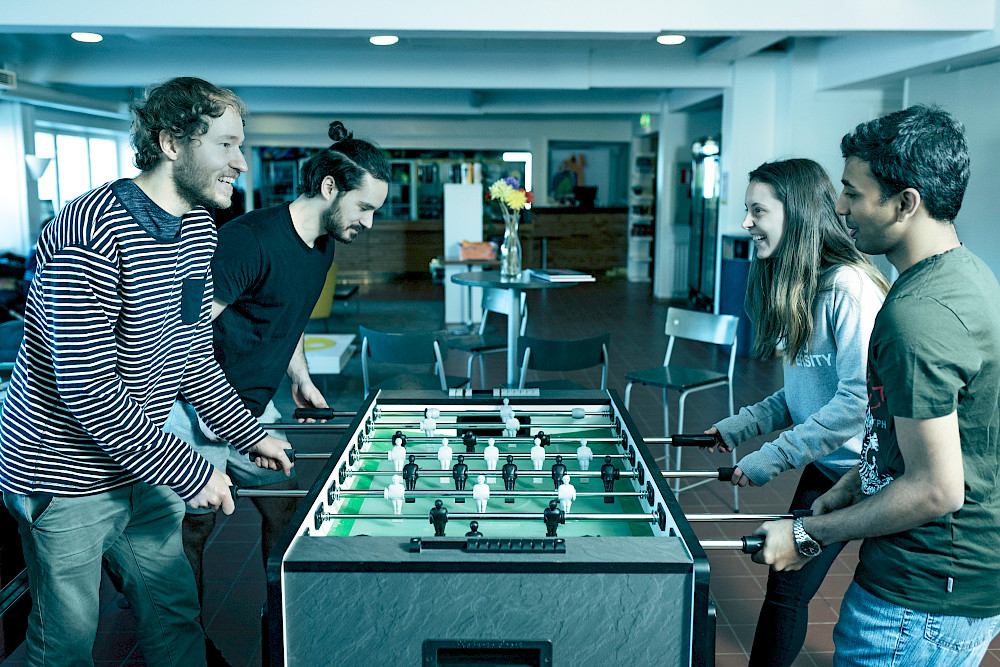Physical activity fixes the corona-induced wellbeing deficiency
Distance learning, forced by corona constraints, easily exposes the student to difficulties in concentration, body aches and loneliness. Even before the corona, students sat for nearly 11 hours a day. In light of these facts, higher education sports are a necessary pillar of student and staff well-being now in the final stages of the pandemic as well as when studies move back to campuses.

The Finnish Minister of Science and Culture Annika Saarikko has been spurring on the leadership of higher education institutions to make a more active effort for the sake of student wellbeing during the emergency conditions. According to Saarikko, too many a student is left alone during the exceptional circumstances, and fixing it takes immediate support from higher education institutions.
The effects of physical activity on energy levels, learning ability and the sense of community are an extremely important part of wellbeing during emergency conditions and beyond. The corona restrictions have forced students to stay in their homes, sitting alone all day. Such a way of studying easily exposes students to difficulty with concentration, pains in the body, and loneliness.
Luckily higher education has seen creativity pop up: for example, active teaching models within language learning has added more physically activity, energy, and interaction. Students have expressed broader interest in making teaching more active, as a result of which OLL and teachers worked together to create the video and website for Movement drives Achy away, to be used by teachers and higher education communities.
Supporting a physically active study day is worth holding on to now when campuses are slowly opening up again. The importance of physical activity to health, learning and the sense of community is not going anywhere. Before corona, higher education students sat for more than 10 hours a day on average, and the recommendations for physical exercise only came true for one in three students (FSHS 2016, OLL 2018).
Students themselves also suffer the effects, but the individual is powerless against structures that make one passive:
“It (taking breaks from sitting) is very tricky here, especially during lectures. You can’t stand up, the lecture rooms being how they are.”
Combatting attitudes all alone is also hard:
“Of course people would be looking at you like ‘what’s that guy doing over there’ (standing up during lectures).”
(Quotes: Leppänen 2016.)
When the individual is confronted with the knowledge of the effects of lack of physical activity without any chance to fix the situation, ignorance is certainly bliss.
Nowadays we know that in addition to health benefits, physical activity also has a positive impact on learning. Staying active during your studies stimulates the blood flow to the brain and therefore immediately improves key cognitive functions, such as attentiveness and memory. On the other hand, regular endurance exercise in one’s free time has been found, in the long run, to increase the size of the hippocampus, which is essential to learning. (Kantomaa et al. 2018.)
A healthy student who can learn effectively benefits the entire higher education community. Some concrete actions to secure this include free registration in The Ministry of Education and Culture’s Students on the Move programme and getting familiar with OLL’s Higher Education on the Move services. They are an easy place to start, as early as today!
Higher education institutions require cross-cutting measures to fix the wellbeing deficiency caused by the coronavirus restrictions. As part of their duties relating to educational and social impact described in the Higher Education Act, higher education institutions train new workforce to meet the greatest challenges of the future. What if the workforce loses or severely endangers its ability to work even before they enter the labour market? If higher education institutions neglect the work for the wellbeing of the higher education community, the social impact goes up significantly, but in a very destructive and far-reaching way. For this reason, returning to the campus must involve securing that the higher education sports may continue and that its requirements meet at least pre-corona levels.
The article uses the following sources:
Kantomaa, M., Syväoja, H., Sneck, S., Jaakkola, T., Pyhältö, K. & Tammelin, T. 2018. Koulupäivän aikainen liikunta ja oppiminen– tilannekatsaus tammikuu 2018 (katsaus). Helsinki: National Board of Education. Available via: KOULUPÄIVÄN AIKAINEN LIIKUNTA JA OPPIMINEN (in Finnish).
Leppänen, A. 2016. “Pitäis liikkua enemmän” – kvalitatiivinen esitutkimus vähän liikkuvien korkeakouluopiskelijoiden suhteesta liikuntaan. Helsinki: The Finnish Student Sports Federation (OLL). Summary available via: SUOSITUKSET 2018 p. 107-119 (in Finnish).
OLL. 2018. Recommendations for University Sports 2018. Available via RECOMMENDATIONS 2018 p. 52 (in Finnish, summary in English).
THE FINNISH STUDENT HEALTH SERVICE (FSHS). 2016: The Finnish Student Health Survey 2016. Available via KORKEAKOULUOPISKELIJOIDEN TERVEYSTUTKIMUS 2016 p. 50 (in Finnish, abstract in English).
You may also be interested in
-
We will include students in the promotion of exercise
Published:The problems of students are hidden beneath the coping narrative, and the cause is their youth, writes Niko Peltokangas, Secretary General of OLL. During the parliamentary election, the Federation is campaigning to see students identified as a separate group in the legislation for exercise promotion.
Read more about article: We will include students in the promotion of exercise
-
SELL-kisojen isännöinti tarjoaa mahdollisuuden kansainväliseen profiloitumiseen
Published:SELL Student Games on kansainvälinen korkeakouluopiskelijoille tarkoitettu opiskelijaliikuntatapahtuma. Toukokuun toiseksi viimeisenä viikonloppuna pidettävien SELL-kisojen järjestämisestä vastaavat vuoroin neljä SELL-maata: Suomi, Viro, Latvia ja Liettua. Vuonna 2025 on jälleen Suomen vuoro isännöidä kisoja.
-
Time to put an end to issues in student wellbeing - The Finnish Student Sports Federation demands actions for university sports
Published:The increase of poor wellbeing among university students is common knowledge, but attempts to take on the issue have remained lukewarm. At the next parliamentary election it is time to focus on university students’ wellbeing and physical activity, the Finnish Student Sports Federation (OLL) demands at their General Assembly, held in Vuokatti on the 2nd and 3rd November.
Share this page
Page last updated 3.5.2021
